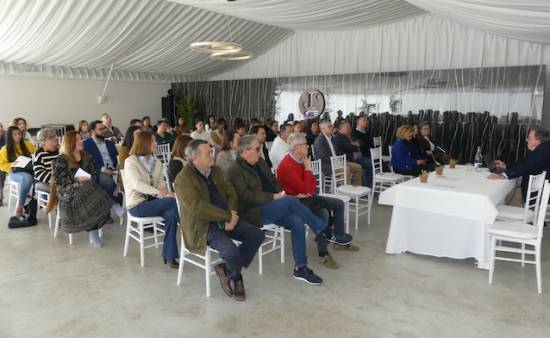
The territorial delegate of Employment, Enterprise and Self-Employment, Amós García Hueso, has closed this Thursday in Tíjola, the final day framed in the project ‘Rural women in the Almanzora Valley’ promoted by the Association of Municipalities of the Almanzora Valley and funded by the Ministry of Employment with 110,750 euros, which has improved employment opportunities for 54 unemployed women in the region with guidance actions, training and digital training.
Amós García highlighted «the Andalusian Regional Government’s commitment to women’s equality in the workplace» and thanked the president of the Association of Municipalities of the Almanzora Valley, Antonio Ramón Salas, and the mayor of Tíjola, Juan José Martínez «for their involvement and collaboration in providing comprehensive care to more than fifty women in the region to achieve their employability».
This project is one of eleven that the Andalusian Regional Government has promoted in the province with 1,279,410 euros and the collaboration of social entities, the Provincial Council of Almeria and the Mancomunidad del Almanzora, within the framework of the Support Programme for Rural and Urban Women, whose objective has been to facilitate the integration of 574 unemployed women from fifty municipalities in Almeria. This programme is part of the Andalusian Regional Government’s Recovery, Transformation and Resilience Plan, financed with Next Generation Funds.

The Rural Women’s Support Programme is aimed at women mainly from municipalities at risk of depopulation and who need training or retraining, to facilitate their access to employment, either as self-employed or by setting up a company, for example with the social economy formula. In this sense, Amós García stressed that this initiative helps to stop the exodus from rural municipalities «by bringing useful resources to women in these areas».
He also recalled two other initiatives to combat depopulation, such as the Andalusian Regional Government project ‘Andalusia Demographic Challenge’ which, among other measures, will bring together in a web portal the potential of municipalities to attract inhabitants, gathering information on public services, opportunities and lines of aid; and the Prepared programme carried out by the Ministry of Employment with training activities to train unemployed women in rural areas as entrepreneurs and in the use of ICTs.
García Hueso has encouraged the beneficiaries of the Rural Women in the Almanzora Valley project to continue expanding their qualifications in other areas with the Vocational Training for Employment actions programmed by the Andalusian Regional Government in the province and those of the Marble School of Fines, and has transferred them the support resources of the Ministry of Employment if they decide to undertake, such as the zero quota and incentives to start self-employed activity or aid for the incorporation of working partners in social economy enterprises.
For his part, the president of the Mancomunidad de Municipios del Almanzora, Antonio Ramón Salas, stressed «the importance of the training being provided by the Andalusian Regional Government for the development of rural women in rural areas, as is the case of the Almanzora Valley, because it gives them hope for finding a job» and pointed out that it is necessary «to continue to support programmes like this in a definitive and clear way».
Training actions and digital skills workshops
The ‘Rural women in the Almanzora Valley’ project has helped 54 unemployed women, 32 of whom have participated in training activities and digital skills workshops, and personalised insertion itineraries have been drawn up for 29 of the users. On the other hand, 21 women have benefited from labour intermediation actions with companies to facilitate their labour insertion and 14 women (26% of the participants) have obtained a job after going through the programme, which envisaged a minimum labour insertion of 20% of the participants. In addition to the initial dissemination and recruitment actions, diagnostic interviews have been carried out with all those interested, individualised guidance sessions have been held and 29 personalised job placement itineraries have been designed, including training actions and basic digital skills workshops.
The training started in March 2023, with 120 hours of duration in each course focusing on two different specialities: sustainable local agriculture and agri-food transformation (included in green employment) and administration and digital commerce (included in digital employment). After completing this training, the users have attended workshops on transversal skills, such as waste management and advanced digital skills.
The aim of these training courses and workshops is to help the users of the green jobs programme find employment in occupations such as harvesting and processing local agri-food products, such as almonds and olives, or in the felling and pruning of these crops, as well as in the production of handmade products or organic farming, which are present in the area; while the users of the ‘digital employment’ modality have focused their work path on offering their knowledge and skills in digitalisation to the SMEs of the region, thus contributing with their work to the digital modernisation of the productive fabric of the Almanzora Valley. Regarding the profile of the participants, most of them had not been in the past.
